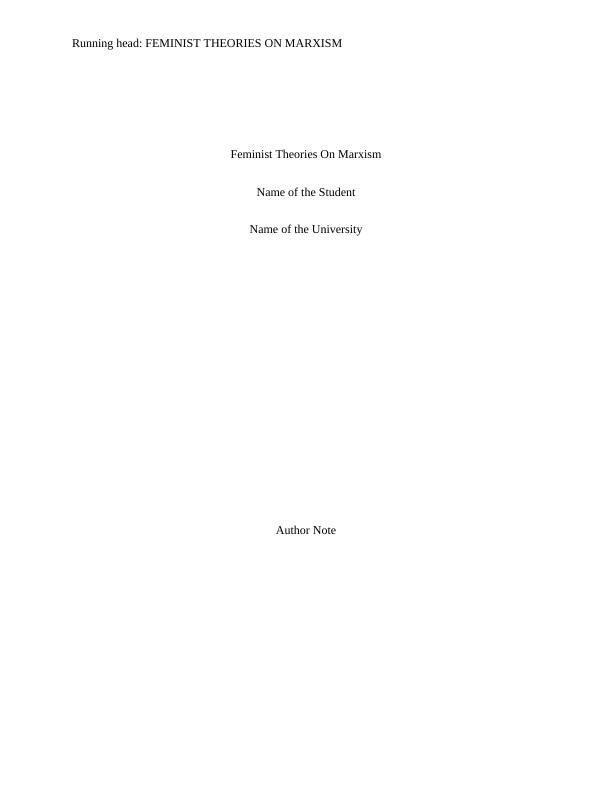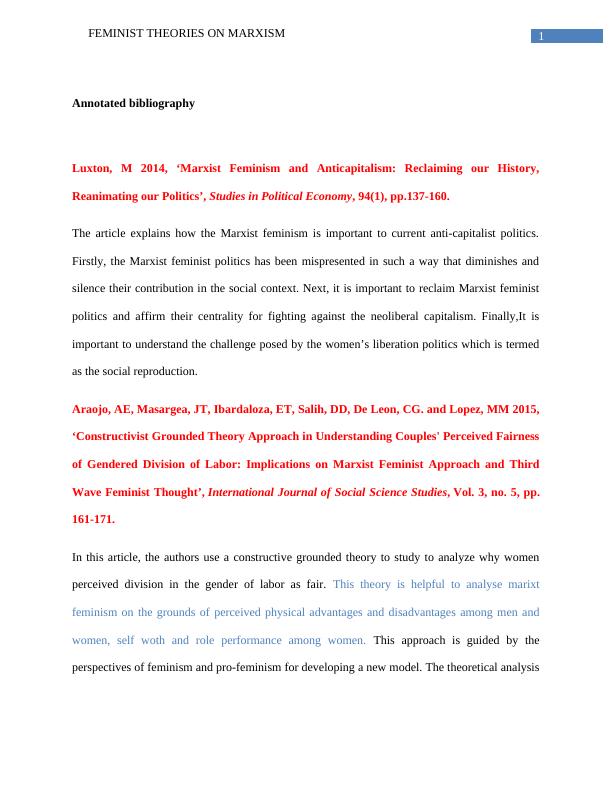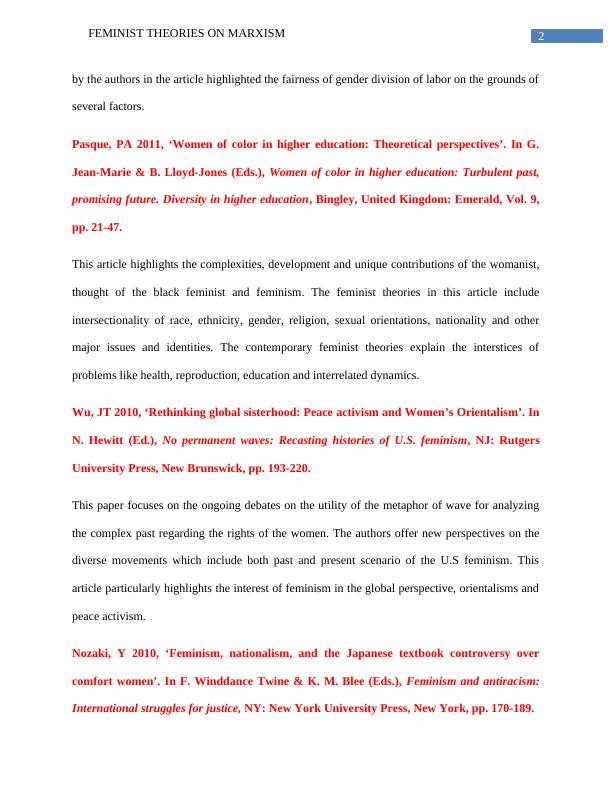Feminist Theories On Marxism
Added on 2023-06-15
8 Pages1949 Words72 Views
Running head: FEMINIST THEORIES ON MARXISM
Feminist Theories On Marxism
Name of the Student
Name of the University
Author Note
Feminist Theories On Marxism
Name of the Student
Name of the University
Author Note

1FEMINIST THEORIES ON MARXISM
Annotated bibliography
Luxton, M 2014, ‘Marxist Feminism and Anticapitalism: Reclaiming our History,
Reanimating our Politics’, Studies in Political Economy, 94(1), pp.137-160.
The article explains how the Marxist feminism is important to current anti-capitalist politics.
Firstly, the Marxist feminist politics has been mispresented in such a way that diminishes and
silence their contribution in the social context. Next, it is important to reclaim Marxist feminist
politics and affirm their centrality for fighting against the neoliberal capitalism. Finally,It is
important to understand the challenge posed by the women’s liberation politics which is termed
as the social reproduction.
Araojo, AE, Masargea, JT, Ibardaloza, ET, Salih, DD, De Leon, CG. and Lopez, MM 2015,
‘Constructivist Grounded Theory Approach in Understanding Couples' Perceived Fairness
of Gendered Division of Labor: Implications on Marxist Feminist Approach and Third
Wave Feminist Thought’, International Journal of Social Science Studies, Vol. 3, no. 5, pp.
161-171.
In this article, the authors use a constructive grounded theory to study to analyze why women
perceived division in the gender of labor as fair. This theory is helpful to analyse marixt
feminism on the grounds of perceived physical advantages and disadvantages among men and
women, self woth and role performance among women. This approach is guided by the
perspectives of feminism and pro-feminism for developing a new model. The theoretical analysis
Annotated bibliography
Luxton, M 2014, ‘Marxist Feminism and Anticapitalism: Reclaiming our History,
Reanimating our Politics’, Studies in Political Economy, 94(1), pp.137-160.
The article explains how the Marxist feminism is important to current anti-capitalist politics.
Firstly, the Marxist feminist politics has been mispresented in such a way that diminishes and
silence their contribution in the social context. Next, it is important to reclaim Marxist feminist
politics and affirm their centrality for fighting against the neoliberal capitalism. Finally,It is
important to understand the challenge posed by the women’s liberation politics which is termed
as the social reproduction.
Araojo, AE, Masargea, JT, Ibardaloza, ET, Salih, DD, De Leon, CG. and Lopez, MM 2015,
‘Constructivist Grounded Theory Approach in Understanding Couples' Perceived Fairness
of Gendered Division of Labor: Implications on Marxist Feminist Approach and Third
Wave Feminist Thought’, International Journal of Social Science Studies, Vol. 3, no. 5, pp.
161-171.
In this article, the authors use a constructive grounded theory to study to analyze why women
perceived division in the gender of labor as fair. This theory is helpful to analyse marixt
feminism on the grounds of perceived physical advantages and disadvantages among men and
women, self woth and role performance among women. This approach is guided by the
perspectives of feminism and pro-feminism for developing a new model. The theoretical analysis

2FEMINIST THEORIES ON MARXISM
by the authors in the article highlighted the fairness of gender division of labor on the grounds of
several factors.
Pasque, PA 2011, ‘Women of color in higher education: Theoretical perspectives’. In G.
Jean-Marie & B. Lloyd-Jones (Eds.), Women of color in higher education: Turbulent past,
promising future. Diversity in higher education, Bingley, United Kingdom: Emerald, Vol. 9,
pp. 21-47.
This article highlights the complexities, development and unique contributions of the womanist,
thought of the black feminist and feminism. The feminist theories in this article include
intersectionality of race, ethnicity, gender, religion, sexual orientations, nationality and other
major issues and identities. The contemporary feminist theories explain the interstices of
problems like health, reproduction, education and interrelated dynamics.
Wu, JT 2010, ‘Rethinking global sisterhood: Peace activism and Women’s Orientalism’. In
N. Hewitt (Ed.), No permanent waves: Recasting histories of U.S. feminism, NJ: Rutgers
University Press, New Brunswick, pp. 193-220.
This paper focuses on the ongoing debates on the utility of the metaphor of wave for analyzing
the complex past regarding the rights of the women. The authors offer new perspectives on the
diverse movements which include both past and present scenario of the U.S feminism. This
article particularly highlights the interest of feminism in the global perspective, orientalisms and
peace activism.
Nozaki, Y 2010, ‘Feminism, nationalism, and the Japanese textbook controversy over
comfort women’. In F. Winddance Twine & K. M. Blee (Eds.), Feminism and antiracism:
International struggles for justice, NY: New York University Press, New York, pp. 170-189.
by the authors in the article highlighted the fairness of gender division of labor on the grounds of
several factors.
Pasque, PA 2011, ‘Women of color in higher education: Theoretical perspectives’. In G.
Jean-Marie & B. Lloyd-Jones (Eds.), Women of color in higher education: Turbulent past,
promising future. Diversity in higher education, Bingley, United Kingdom: Emerald, Vol. 9,
pp. 21-47.
This article highlights the complexities, development and unique contributions of the womanist,
thought of the black feminist and feminism. The feminist theories in this article include
intersectionality of race, ethnicity, gender, religion, sexual orientations, nationality and other
major issues and identities. The contemporary feminist theories explain the interstices of
problems like health, reproduction, education and interrelated dynamics.
Wu, JT 2010, ‘Rethinking global sisterhood: Peace activism and Women’s Orientalism’. In
N. Hewitt (Ed.), No permanent waves: Recasting histories of U.S. feminism, NJ: Rutgers
University Press, New Brunswick, pp. 193-220.
This paper focuses on the ongoing debates on the utility of the metaphor of wave for analyzing
the complex past regarding the rights of the women. The authors offer new perspectives on the
diverse movements which include both past and present scenario of the U.S feminism. This
article particularly highlights the interest of feminism in the global perspective, orientalisms and
peace activism.
Nozaki, Y 2010, ‘Feminism, nationalism, and the Japanese textbook controversy over
comfort women’. In F. Winddance Twine & K. M. Blee (Eds.), Feminism and antiracism:
International struggles for justice, NY: New York University Press, New York, pp. 170-189.

End of preview
Want to access all the pages? Upload your documents or become a member.
Related Documents
Theories of Sociologylg...
|4
|630
|40
Feminist Social Theory and its Impact on Social Work Practicelg...
|15
|4160
|473